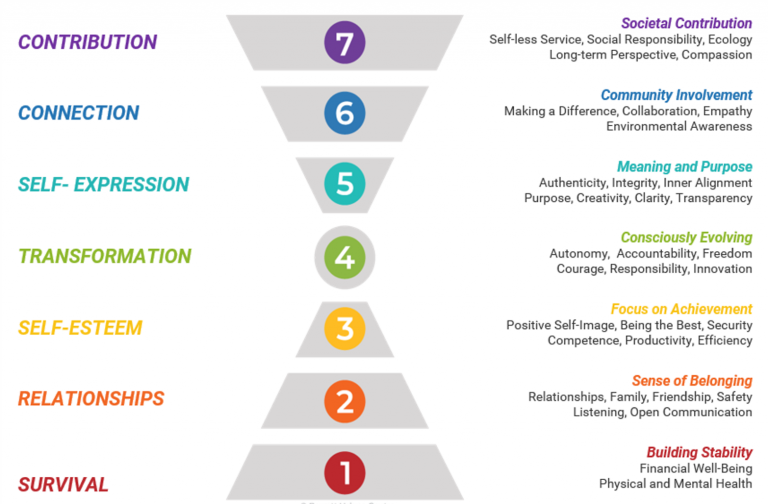Why personal values matter
This post explores the importance of knowing and harnessing your personal values as a key navigation system in life and leadership.
Deep down inside what is important to you? What do you want your life to stand for? What sort of qualities do you want to cultivate as a person? How do you want to be in your relationship with others? What matters to you?
In every area of life we make decisions and choices based on what is important to us. This includes what we value as individuals as well as what we absorb of the spoken and unspoken expectations of the communities and organisations of which we are a part.
We are often unaware of the mix and interplay of values that motivate us to act, and that inform our decisions. In organisations, lists of values are more often statements of intent than accurate reflections of how things are really done. Even where the intent is genuine, the greater the gap between words and action the greater the perception of a lack of integrity, resulting in cynicism and disengagement.
Through the process of clarifying our core values – our heart’s deepest desires for how each of us wants to behave as a human being – and using those values to motivate, inspire and guide our ongoing actions, we grow as people and develop our capacity and capability as leaders.
Our bodies know when we act out of alignment from our values
Just as it is within a organisation, it’s critical that our actions are in concert with our core values. Aside from this being important for our integrity, often our bodies will react when we act out of alignment with our personal values. Perhaps you can recall a time when you have felt a pain in the chest or tightness in the belly in such a situation?
I recently coached a senior leader from the professional services sector with the specific brief of developing his capacity and capability to have courageous conversations. He was deeply aware that there was a conversation he needed to have with a member of his team – and should have had months ago – and that the longer he left it the more impact his lack of action was having on the broader team.
However, he felt ill equipped and fearful of having this conversation. He also felt that he was out of integrity with himself in not finding the courage to have it, and that this inner conflict was having a physical and behavioural affect on him.
Limiting values impact how we ‘show up’
As part of our coaching this leader completed a Personal Values Assessment and amongst his list of positive personal values, he had selected a limiting value of ‘being liked’. We explored this value and unpacked the impact that it was having on how he was leading his team overall and specifically with respect to this difficult conversation he had been putting off.
This leader had a good level of personal awareness and he was able to identify that his needing to ‘be liked’ probably stemmed from his childhood place in his family and the wider family dynamics. The power here was for him to see this value written on the page and to directly draw the link to see how the need to be liked was holding him back from having a difficult conversation. More broadly, this value was keeping him from becoming a better version of himself.
Through support and planning for this conversation, this leader was able to lean into his own discomfort (it hadn’t gone away – he just decided to acknowledge it and take action anyway). He had the conversation, and while it was difficult it was ultimately a great gift for both the leader and his team member.
This is an example of how when we want to change behaviour we need to look below the surface to our mindsets, beliefs and values and see what is actually driving our behaviours. From there we can create change.
This leader went a step further and embarked upon a personal values assessment for his direct reports along with a facilitated personal values learning and development session that included him sharing his own journey with the need to ‘be liked’. The group session allowed the team to began to look at the personal values they had in common as a way of building connection and focus and moving toward getting clearer on team values.
Values – based leadership keeps us centered and focused
“Values based leadership and values-based decision making allows us to throw away our rule books. When a group of people espouse an agreed set of values and understand which behaviours support those values, then you no longer need to rely on bureaucratic procedures setting out what people should or should not do in specific situations. All the rules reduce to one—live the values. People can work out for themselves what they need to do, and in so doing become responsible and accountable for their behaviours.” – Richard Barrett
The benefits of becoming a values-driven leader are:
- Leaders become conscious about what drives their decision making and can move towards values-based decision making – a key step in authentic leadership as it transcends personal beliefs.
- Leaders better understand who they are and what’s important to them and why they are motivated or inspired by some things and challenged by others.
- Leaders better understand their people and can design for and create a workplace that maximises engagement and fulfilment.
- Values provide a compass for leaders: a reference point to inform direction, guide how they engage and inspire their teams and how and why they make certain decisions.
Source: Adapted from work of Richard Barrett, Barrett Values Centre
Values have significant power to unite and energise people. Shared values can connect, where race, religion, politics and gender can divide. Becoming a values-driven leader means understanding what is important to you personally and collectively and being committed to acting on those values.
Interested in leveraging values to ignite growth in your organisation? At Evolving Leaders, we support you to unlock the power of values using the Barrett Values Centre Cultural Transformation Tools (CTT) to measure leadership and team values and culture through:
1. Executive Coaching: Leadership Values Assessment and Development
2. Team Culture Assessment and Development: measuring and managing your team’s culture using the Cultural Transformation Tools to surface the invisible factors driving performance and engagement to grow a psychologically safe team culture and strengthen team performance.





